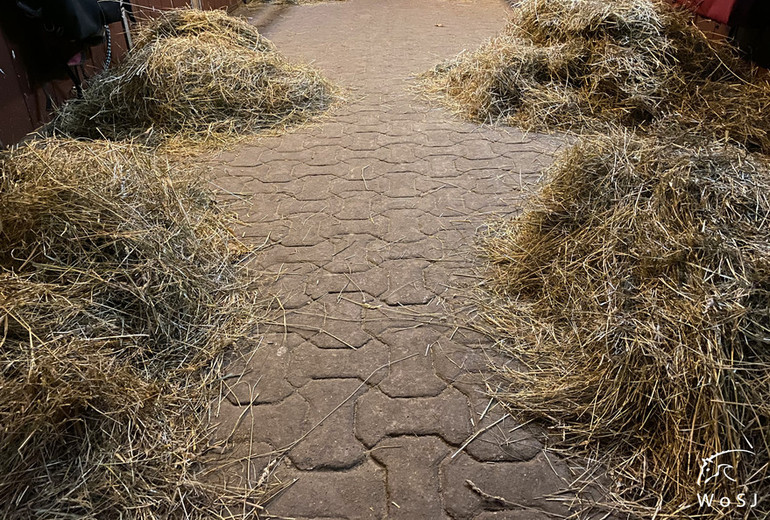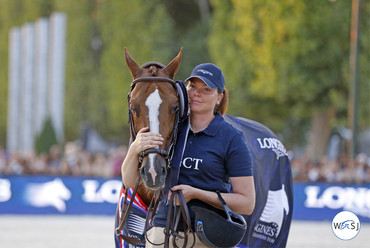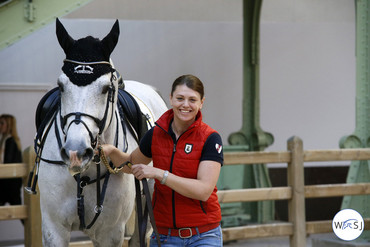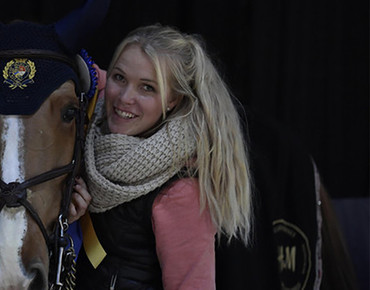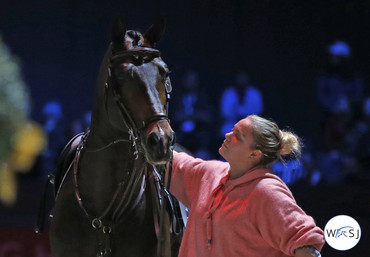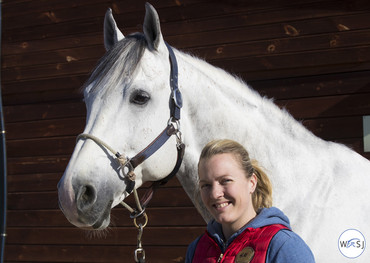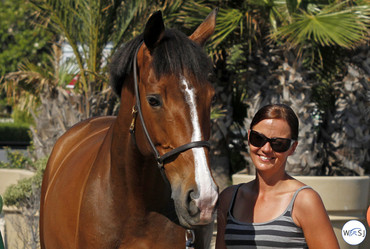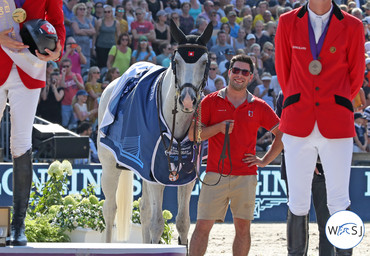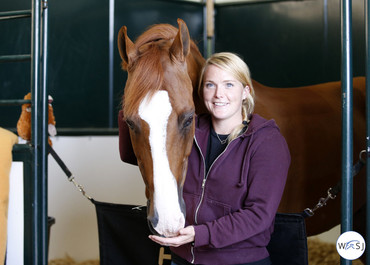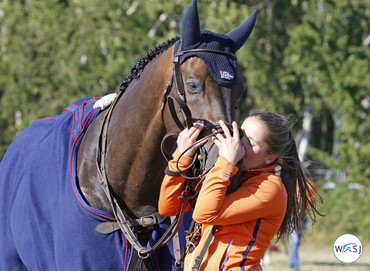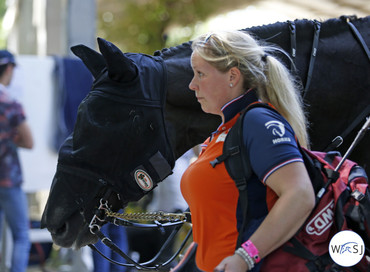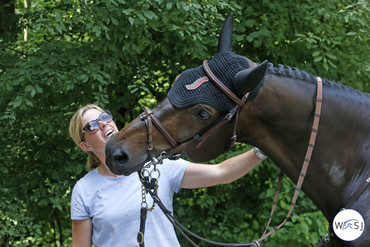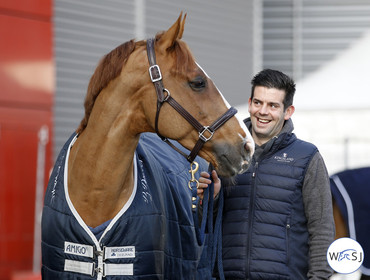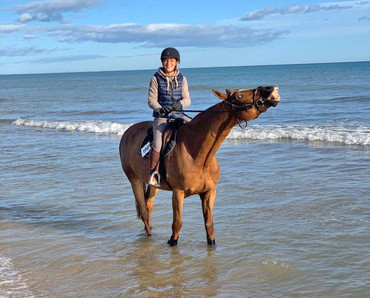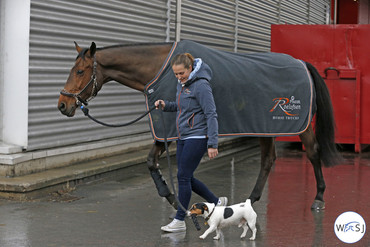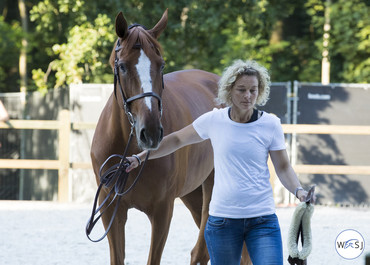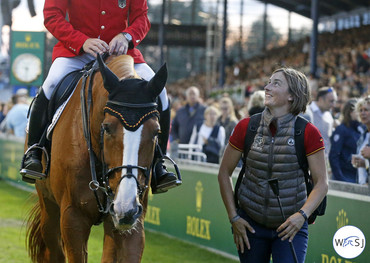World of Showjumping asked several highly experienced grooms to share their best tips & tricks. In this next part of our series, we learn more about preferable feeding routines, different views on supplements as well as dos and don’ts when it comes to feeding.
Marlen Schannwell, long-time groom for Bertram Allen:
“We feed at 7 AM, first hay and then grain. At 13 we feed grain again and 16:30 hay and at 17 dinner. A few sensitive horses get their grain in five meals instead. Half of our horses have straw bedding so they can chew 24 hours, while the other horses – that are chubbier – are on shavings but they will get more hay or lucerne to keep a good fibre intake. All our horses will also be in grass fields at least two hours a day. At dinner, all the horses get extra oil and chaff (lucerne / alfalfa) and their supplements plus electrolytes when it’s hot. Good quality hay and feed is the key for a healthy horse and a happy stomach.
In my opinion, do not feed grain before hay and when the horses are on shaving it’s an extra no. The horses need to get a chance to produce enough saliva and acid in the stomach, before getting hard feed. As the stomach is very small the grain would otherwise go straight into the digestive system without being proper dissolved.
At the show it’s not always easy but we never feed the horses before training or showing. Give them at least 1-2 hours time to digest.
We check the blood of our horses regularly to make sure we are doing everything right. Sometimes there is too much or too little mineral in the hay or grass so we need to regulate that with mineral supplements. We feed Red Mills and Foran and with that we barely need to add anything extra, apart from good electrolytes after training or when it’s hot or perhaps good quality hoof and joints supplements. Our horses also get garlic seaweed, which is a great all around natural supplement. They also always have a salt lick at home and at the show.
We do not like to feed too much extras like Gastro Guard, as it only gives a short time relief. So we make sure to have a good hay – grain balance. Count out the meals for each horse and follow the feed times. And cure gastric problems with probiotic and stomach healing products.”
Kay Neatham, former long-time groom for Marcus Ehning:
“Feeding routines are again what the rider or groom believes in and what they have found to work for them. However, when I was starting out grooming I learnt the ten rules of feeding and I think they still cover everything about feeding horses today:
1. Feed little and often
2. Always water before feeding
3. Always keep to a routine
4. Feed bulk foods
5. Do not work directly after feeding and do not feed a hot, sweaty horse
6. Always over-boil rather than under-boil; this doesn't often apply today but in the good old days I use to cook linseed and/or barley every night to add to the mash
7. Feed according to work being done, size, age, time of year and temperament
8. Changes should be introduced gradually
9. Feed ONLY good quality
10. Feed something nice (apples and/or carrots)!
In order for supplements to not end up being something that is fed because so and so said it's good or because you believe it works, get blood tests done regularly by someone who has a lot of experience in reading and interpreting them. Supplements can cause massive and unnecessary costs, where I believe money could be better spent on good quality hay for example.”
Josie Eliasson, long-time groom for Jessica Springsteen:
“Our feeding routine is a bit of a mix of the American and European way. We always feed hay first. At breakfast they get hay and then grain, at lunch hay and then grain and in the afternoon hay and then at dinner grain. Every day we feed the dinner wet with a little bit of mash. We do feed dinner a little bit earlier than what is the typical time in Europe, around 4pm. But once we're in America, we are always the last to feed at that time. At the show I always try to keep my feeding routine as much as possible, and if I forget my horses will remind me.
Everyone has different routines that work for their horses and I don’t think there are so many rights and wrongs with how you feed. I just don't think it’s very good for the horses to change the feeding times too much. You have to do that sometimes while travelling for example, but then I will always give them a bit of wet food instead of their normal grain.
When it comes to supplements, we use Platinum Performance for our horses, which we really like. They typically get a joint supplement, a muscle supplement, a gastric supplement, a bone caring supplement, electrolytes and oil. For our horses that are a bit to happy for food, they have a great supplement that converts fat in to energy that really works.”
Nickki O’Donovan, long-time groom for Darragh Kenny:
“Horses live by routine and they can tell the time! Try to keep it the same every day as much as possible. E.g. we feed hay and grain at 7, 12, 5, and 9. At shows it can obviously be more difficult to keep a routine, so then it is the most important for me that they always have hay. I always travel my horses with hay nets.
It’s always better to exercise a horse when they have food in the belly, hence why I like to give them as much hay as possible. I would never give a horse a bucket of grain when they have just been exercised and are still a little warm or sweating though.
Less is more with supplements. I like electrolytes and equine omega oil. And maybe an older horse will need something for the joints, or some horses need some help with muscle development – it all depends. Our younger horses don’t get supplements though. They shouldn’t be given something just for the sake of it.”
Malin Henlöv, former long-time groom for Peder Fredricson, now working for Evelina Tovek:
“We feed our horses four times a day – three times with hard food and hay and at the night check they only get hay. We always give them the hay 20-30 minutes before the hard food to let the stomach get going and to prevent constipation. We always try to give the horses a lot of hay and as little hard food as possible. This is very different from horse to horse, but with hot and nervous horses I think they mostly get calmer if you take away the hard food. That is much more effective than to give them a lot of calming supplements. At shows I try to keep the same feeding routines as at home.
We use as little supplements as possible and try to keep it to salt and oil. But horses that travel a lot are often doing well with some sort of probiotic for the stomach and the older horses might need something for their joints.”
Heidi Mulari, long-time groom for Steve Guerdat:
“Our horses have a pretty hectic life so I like them to have at least regular feeding times. It really upsets me if horses have to eat too early/too late at home. They have to know there is a routine for this.
In feeding, less is sometimes more so I try to keep it as simple as possible. And I feed bran daily; horses will eat their supplements better with a little bran in their evening feed and it's also good for their digestive system.
Over the last few years I have realised how important it is that they feel well in their stomach. Always feeding Gastro-Guard gets very expensive, so I normally start with that and then carry on with for example GNF from TRM. If a horse stops eating the grain, it most likely has a stomach issue. They also need enough hay. This turns very tricky when the horses should also stay slim… That's why we feed hay many times a day in small portions. Then the horses are less hungry and don’t stuff themselves full with straw. Some horses get their hay in the net, so the portion lasts longer and the stomach doesn’t stay empty too long and start to produce too much acids.”
Sean Vard, long-time groom for Martin Fuchs:
“We feed three meals per day, twice hay and twice haylage. We like the horses to eat haylage before the breakfast, and haylage before the dinner. The haylage is obviously more intense on the stomach and requires the stomach digestive system to work harder breaking the food down. Like this we can rest easy knowing the meals and supplements given in the main meals are digested correctly and the horses receive the full potential out of each supplement.
We feed basic supplements like vinegar, sunflower oils, black oils, ginger and muscle aid. We keep things simple and only add further products if we feel the horses absolutely require them.
On the shows I tend to keep the horses with hay at all times during the day. Obviously on shows the horses don’t get to enjoy the field or paddock time like at home, so I try to keep them happy and busy at all times.”
Denise Moriarty, long-time groom for Kent Farrington:
“We start the morning with hay followed by grain. Always hay before grain! Horses are grazers so they need some forage throughout the day to keep the stomach healthy. However, every barn is different, every system is different and if it works for you and your horses then there is no right or wrong. Our horses get hay four times a day – breakfast, lunch, dinner and night check and grain twice a day.
We feed high quality feed and hay and we keep our supplements simple. Our horses get electrolytes and Platinum CJ. At the show we add Platinum BCAA and Myo-Vet to help muscle recovery.”
Aurelie Marchiando, long-time groom for Leopold van Asten:
“I like to feed a lot of hay – at least three times a day – and then food three times a day. But where I was working before we were used to feed hay two times a day and food two times and we never had any problems there either.
We give oil every day at lunch with electrolytes. I’m not a big fan of a lot of supplements, so maybe we give a cure two times a year for muscles (Myoplast) and joints (MSM pure).”
Fran Callan, former long-time groom for Jur Vrieling, now working for Jos Verlooy:
“A routine is vital to every horse. And trust me, they know the time better than we do. We always feed at the same time – at home or at shows. We do really try to keep the horses in their system. Do not change what works. If you change too much it only causes digestion problems or worse, colic.
We always feed hard feed before hay in the morning, and then in the evening hay, hard feed then a late hay. I always give them the time to eat without being disrupted. This is very important.
Supplements; again – we like to keep simple. We only really feed oil to help keep the horses looking great. And of course carrots. For the rest it is just electrolytes – especially on the hot and warm days.”
Madeleine Broek, long-time groom for Marc Houtzager:
“We start in the morning with feeding hay and after that we muck out the stables. About an hour later we feed the oats, pellets and muesli. Around 12.30 we feed lunch and around 16.00 we feed hay again and when we are finished the horses get the oats, pellets and muesli. Every horse gets his or her individual food, depending on his or her needs. In the evening one of us does the night check and feeds hay again.
With lunch, some of the horses get supplements. Synovium sponsors Marc and they have a large product range of supplements.”
Sean Lynch, long-time groom for Daniel Deusser:
“Keeping a feeding routine is important. At home, we always feed at 7am - noon - 5pm. Unless the day is totally crazy the feeding time can only change with 10-30 minutes. I think it’s important to try not to change too much.
When it comes to dos and don’ts, do not change food fast. Our horses are also weighed at least once a month so we can observe any changes and adjust the feed accordingly.
We are also not real big supplement people. We give oil every day and a few small things like biotin to help the feet grow, but apart from that we are pretty simple.”
Lena Laub, long-time groom:
“I like to feed the horses hay first, then wait 20 minutes before they get the hard food. I also like to feed them several times a day, but less. I think it is a nice feeding routine to give the horses hay four times a day and hard food four times a day. It is just on shows that you have to make a really good plan to get this to work, but normally with a bit of planning it works really well.
Which supplements we use always depends on the horse and what the horse needs.”
Morgane Tresch, long-time groom for Jeroen Dubbeldam:
“We start the day by feeding the horses at 7h15 with power food – pellets and muesli – and later we give hay. Around 12h, the horses get lucerne with carrots. Around 16h we give them hay and around 17h we feed power food again and we add slobber mash.
We give supplement in the food every day. On Monday, Wednesday and Friday they get vitamins. On Tuesday, they get biotin – however, some horses get it like a cure and then they get it every day. In the summer they get electrolytes on Thursdays and then twice a week when its really hot. Every day they get linseed oil and after jumping they get Neutradex for the muscles and Plusvital for the power.
We give all the supplements in the food, but when horses get stronger anti-inflammatory it’s preferable to give it in another bucket and keep this one as a “positive bucket”. You need to be careful what you feed and if you are not sure about one product you better to call your vet twice to be sure before something goes wrong.”
Jenny Ducoffre, long-time groom for Jos Verlooy:
“We do have a strict feeding routine. The horses get hay twice a day, and we feed hard food two times a day – including lots of carrots. Supplements are only fed with the dinner and we keep it as simple as possible – just oil, salt and a vitamin syrup. We prepare the hard food during the day and each horse gets two buckets in front of the box. This prevents that feeding takes very long when it’s time to eat. They get breakfast at 7 so they have an hour time to eat until we all arrive and start cleaning boxes. With cleaning the stalls, they get their first hay, then around 3:30 or 4 pm they get hay the second time and dinner not before 5:30.”
Mel Jobst, long-time groom for Marcus Ehning:
“At home the horses get hard food in the morning and then they get lots of hay after the boxes are done. For lunch they just get a small portion in between. For the last meal of the day they get a lot of hay and then hard food including supplements, mash and bran.
At shows, they get hay and hard food in the morning and for lunch a small portion of hay and hard food. In the evening the horses get hay, mash, supplements and hard food and then hay once more later in the night.
Try not to rush horses while eating. Think how you would feel after eating. Let them have hay at all times so they have something for their stomach and make sure the water is clean at all times. Have the same times for feeding every day, even though this might change a little at shows.
Don’t change food to fast and feed every horse different; make sure it reflects what are they doing at the moment, how are they looking – one might need more extras than the next one.”
No reproduction without written permission, copyright © World of Showjumping



